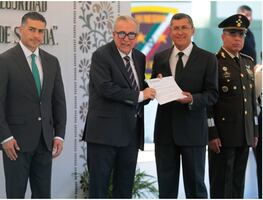Más Información

Videojuegos, el nuevo gancho del crimen para captar menores; los atraen con promesas de dinero y poder

“Vamos a dar apoyo a los pequeños agricultores por sequía en Sonora”; Claudia Sheinbaum instruye a Berdegué

Derrota de México en disputa por maíz transgénico contra EU; estos son los argumentos de Sheinbaum y AMLO para prohibirlo
Every year, hundreds of women are imprisoned in the Barrientos prison in the state of Mexico, one of the most dangerous prisons in Mexico , according to the National Human Rights Commission (CNDH).
For these women, being women and living in Barrientos is a double sentence: they remain forgotten, their families don't visit them, and they don't have many employment options.
Luckily, NGO La Cana has helped women with knitting and embroidery workshops at Barrientos , as well as in other prisons in Santa Martha Acatitla, Chiconautla , and Nezahualcóyotl . This way, women learn to make stuffed animals and make a living.
Those who work with La Cana knit elephants, rabbits, unicorns, ducks, bears, lions, hippopotamuses, chickens, monkeys, dinosaurs, cows, mice, and even nativities. Once the stuffed animals are completed, the NGO commercializes them and the women receive over 30% of the profits , which they use to survive in prison or use to support their families.
Daniela Ancira
, the co-founder at La Cana , explains that “Sadly, everything has a price in jail : hot water, food, visits, pads, calls. On the other hand, 85% of these women have children inside or outside prison , therefore, having an income is essential.” Ancira adds that the program's aim is to achieve the social reintegration of women, who are able to work at La Cana when they leave prison .
Since Daniela Ancira and her colleagues launched this project, they have helped 380 women, nevertheless, Ancira criticizes the fact that women have been forgotten by the prison system because they represent only 5% of inmates and the fact that there is no interest in designing programs for this specific sector.

“More social reintegration programs are needed. It is incredible how in prisons such as the one in Ecatepec ( Chiconautla ) and Barrientos we are the only formal employment sources . If they don't make money with the workshop , they might turn to crime ,” says Ancira.
Ancira
also laments that women are imprisoned in mixed facilities despite the fact that these structures are built with men in mind, therefore, men have more chances of finding a job after being released.
She explains that another aspect is the lack of visits: “Out of all the women who work with us, only 23% see their partner or a family member. It is important to see this through a gender perspective because there is double victimization : first, for being criminals ; and then, for deviating from the stereotype that (women) should behave a certain way.”
Raquel Aguirre
, the director of the legal department at La Cana , explains that in three years, they have been able to change the lives of hundreds of women . “The population should get rid of the stigmas generated by having been in prison in order to create a real change. If women are rejected since they leave jail , their reintegration will be very complicated because we push them to turn to crime again.”
All their products can be purchased online and in different stores . You can find more information here .
gm








